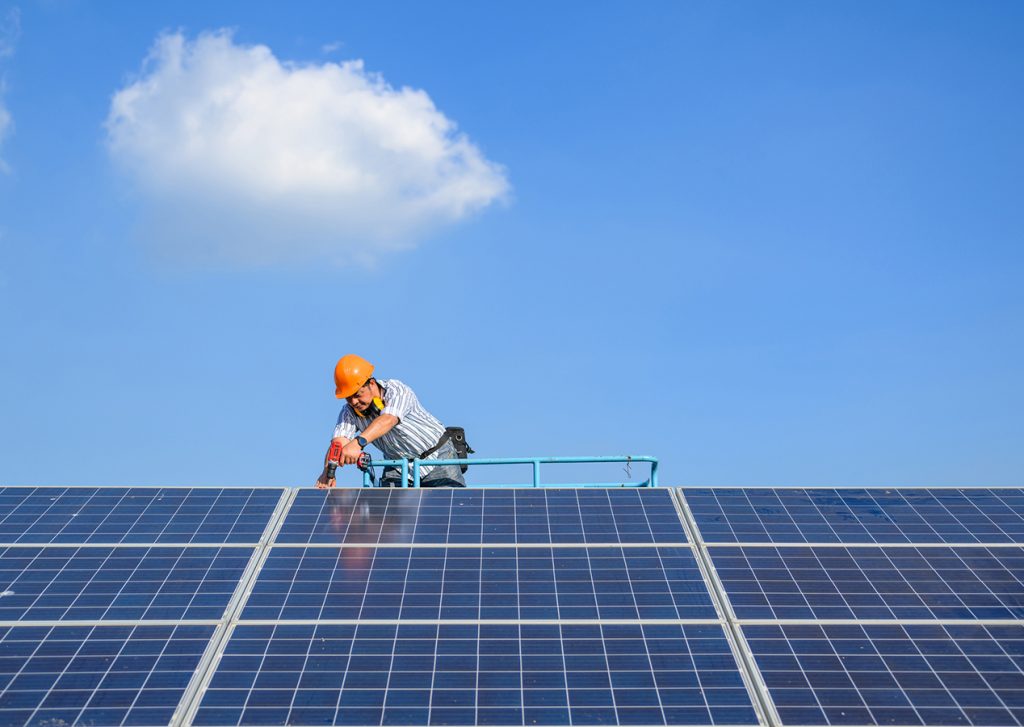Simply Solar Illinois: Eco-Friendly Solar Solutions to Light Up Your Home
Simply Solar Illinois: Eco-Friendly Solar Solutions to Light Up Your Home
Blog Article
How Solar Energy Can Help You Conserve Money and Minimize Your Carbon Footprint
The combination of solar power into your power profile presents an engaging opportunity for both monetary savings and ecological stewardship. As various government rewards become offered, the question develops: how can one properly navigate the first investments and continuous benefits of solar technology to make the most of both financial and environmental gains?
Comprehending Solar Energy Financial Savings
While the transition to solar power frequently entails an initial investment, recognizing solar power savings is important for homeowners and organizations alike. Solar power systems can substantially reduce electrical power expenses by using the sun's energy, equating into considerable long-lasting economic benefits. By producing their own electrical energy, customers minimize reliance on grid power, which is subject to varying rates. These financial savings can gather over time, frequently bring about a rapid return on investment.
In addition, solar energy systems might certify for different monetary incentives, consisting of tax obligation credit scores and discounts, additionally improving their cost-effectiveness. The availability of net metering permits users to sell excess energy back to the grid, producing an additional earnings stream. These variables contribute to the overall savings associated with solar power.

In addition to guide monetary financial savings, solar power offers the added advantage of increasing home value. Homes geared up with solar panels are typically a lot more appealing to buyers, as they guarantee lower energy costs - Simply Solar Illinois. Understanding these components is important for any individual thinking about solar power, as it highlights not just the potential financial gains, yet additionally the broader ecological and financial advantages of adopting renewable resource services
Initial Prices vs. Long-Term Benefits
When reviewing solar energy, it is essential to evaluate the initial costs versus the long-lasting benefits. The in advance financial investment for photovoltaic panels, installation, and relevant devices can be substantial, frequently ranging from $15,000 to $30,000, depending on the system dimension and home energy demands. This preliminary expenditure might discourage some house owners; nonetheless, it is important to consider the possible cost savings over time.
As soon as installed, solar energy systems can significantly minimize or even eliminate monthly power costs, bring about considerable long-term monetary advantages. Research studies show that homeowners can conserve anywhere from $10,000 to $30,000 over the lifespan of their planetary system, generally 25 years. In addition, numerous states use incentives, tax obligation credit histories, and discounts that can offset preliminary prices, making solar much more obtainable.

Lowering Your Carbon Footprint
Lowering your carbon footprint is a critical factor to consider in today's ecologically aware culture, and taking on solar power is just one of the most efficient strategies to accomplish this objective. Solar energy is a tidy, renewable energy that substantially diminishes dependence on fossil gas, which are major contributors to greenhouse gas exhausts.

Furthermore, the extensive adoption of solar modern technology encourages the advancement of green work and sustains developments in power storage space and effectiveness. The more people and companies purchase solar energy, the greater the collective decrease in carbon exhausts, fostering a cleaner ambience for future generations.
Government Motivations and Rebates
Taking on solar power not just benefits the atmosphere yet can also cause significant monetary cost savings, especially with the accessibility of federal government Visit Your URL incentives and rebates. Numerous federal, state, and regional programs are made to encourage house owners and businesses to spend in solar energy systems, making the shift extra inexpensive.
One of one of the most noticeable rewards is the Federal Financial Investment Tax Credit Rating (ITC), which enables planetary system proprietors to subtract a significant percent of the installation costs from their federal tax obligations. This motivation has been crucial in decreasing the in advance costs connected with solar power systems. In addition, several states supply their very own tax obligation credit scores, grants, and rebates that can even more improve financial savings.
In addition, some city governments give real estate tax exemptions for solar setups, guaranteeing that property owners do not face enhanced real estate tax as an outcome of their renewable resource financial investments. Utility companies might also provide rewards, consisting of internet metering and feed-in tariffs, which permit solar power individuals to sell excess power back to the grid.
Picking the Right Solar System
Picking the appropriate planetary system is important for maximizing energy performance and financial advantages. The decision pivots on numerous elements, consisting of power needs, budget, and available space. Homeowners should start by evaluating their electrical energy consumption to determine the system dimension required for ideal efficiency.
Following, take into consideration the various kinds of solar modern technologies offered. Simply Solar Illinois. Photovoltaic Or Pv (PV) panels are the most common, transforming sunlight straight into electricity, while solar thermal systems concentrate on More Bonuses home heating water. Each type has distinctive benefits depending upon private needs
Budget plan considerations are also extremely important. First installment expenses can vary considerably, so it's vital to compare quotes from numerous service providers and discover financing options. Federal government motivations and refunds can further lower the monetary problem, making planetary systems more accessible.
Final Thought
In summary, solar energy provides a viable service for attaining considerable cost financial savings while concurrently reducing carbon exhausts. The first financial investment, though considerable, returns significant long-lasting monetary benefits, with prospective financial savings ranging from $10,000 to $30,000 over 25 years. Moreover, the environmental advantages of solar power add to sustainable techniques critical for combating environment modification. Federal government rewards enhance the usefulness of solar innovation fostering, encouraging a change towards a cleaner, extra financially effective power resource.
Report this page